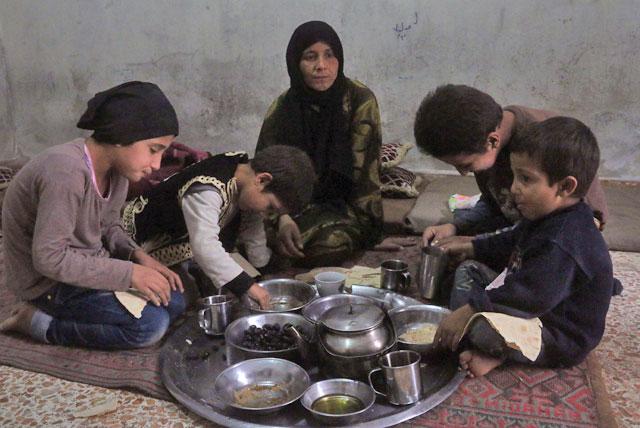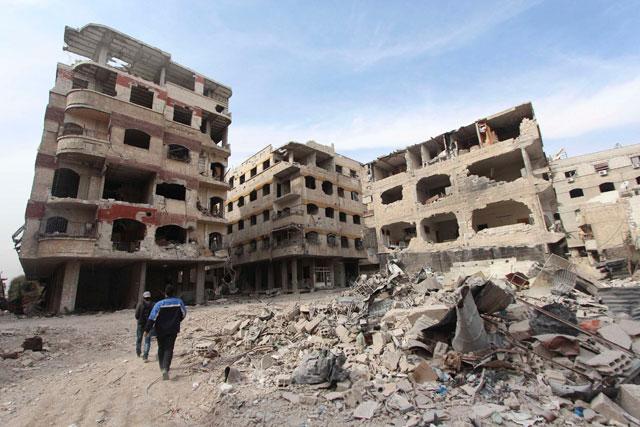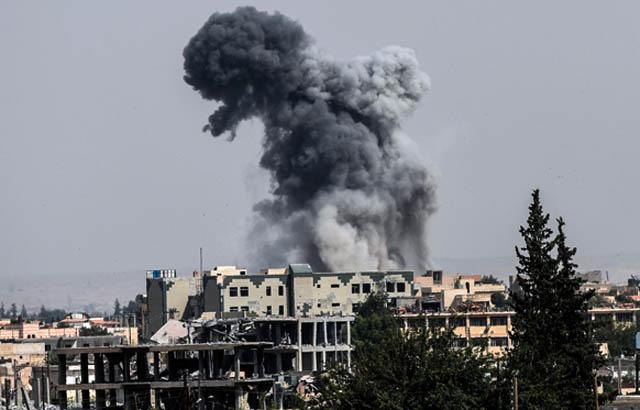You are here
Al Qaeda fighters push offensive in northern Syria
By AP - Nov 03,2014 - Last updated at Nov 03,2014

BEIRUT — Al Qaeda-linked militants pressed an offensive Monday against Western-backed rebels in northern Syria, closing in on a vital border crossing with Turkey and exposing the weakness of mainstream opposition groups that the US hopes to forge into a fighting force to take on Islamic extremists.
Al Nusra Front's recent surge has overrun strongholds in Syria's Idlib province of two prominent rebel factions that proved unable to repel the assault despite getting arms and training from the US. The opposition groups' collapse marks a significant setback to Washington's plan of partnering with more moderate brigades to fight the Islamic State (IS) and other radicals.
Al Nusra Front — a bitter and bloody rival of IS despite their shared extremist ideology — was massing its fighters Monday in the town of Sarmada near the Bab Al Hawa border crossing after sweeping through rebel-held towns and villages over the weekend. As the extent of the rout became apparent, reports also emerged that some rebels had pledged allegiance to Al Qaeda affiliate.
The fighting takes place against the backdrop of US-led air strikes to roll back and destroy IS, which has seized huge chunks of territory spanning Syria and Iraq. That effort has recently focused on the Syrian Kurdish town of Kobani on the Turkish border, where fighting has raged since September.
The two primary targets of Al Nusra Front's attack are the Syria Revolutionary Front and Harakat Hazm. While both rebel groups have received US support, it never reached the levels that either deemed necessary to make significant advances against President Bashar Assad's forces in Syria's 3½-year-old civil war. At the same time, the link to the Americans also earned them the enmity of radical groups.
"The Nusra Front is deeply suspicious of both the SRF and Harakat Hazm because they receive support from the US," said Aron Lund, editor of Syria in Crisis, a website run by the Carnegie Endowment. "The US is also quite open about training rebels to take on both the Islamic State and Al Qaeda, to which the Nusra Front belongs. So from the Nusra Front's perspective, these groups aren't just troublesome rivals, they're a pro-Western fifth column that are slowly being readied for a purge of jihadis."
Tensions between the groups worsened after the US bombed Al Nusra Front bases in Idlib province on the opening night of its air campaign focused primarily on IS. Those air strikes won Al Nusra Front, which has largely focused on fighting Assad's forces, the sympathy of many in opposition-held areas.
Mainstream rebel groups maintain a presence in parts of northern Syria and are also active in the south along the Jordanian border. But the quick defeat of two groups previously considered among the stronger factions in Idlib province "shows that... the moderates are weaker than what we have been led to believe, despite increased funding from the West," said Charles Lister, a visiting fellow the Brookings Doha Centre.
It was unclear how far Al Nusra Front intended to take its offensive in Idlib. In recent days, the group's fighters have been gathering in the town of Sarmada in northern Idlib province, about 6 kilometres from Bab Al Hawa, said Assad Kanjo, an anti-Assad activist based in the province.
Rami Abdurrahman of the Britain-based Syrian Observatory for Human Rights also said Nusra fighters had flowed into Sarmada, but said there was no indication they had advanced on the crossing, which is held by a rebel alliance known as the Islamic Front. Bab Al Hawa serves as an important supply route for Western-backed fighters as well as aid groups in northern Syria.
Lister said he did not believe Al Nusra fighters would attack the crossing, saying they were unlikely to directly challenge the Islamic Front, a collection of hardline and moderate Muslim groups. He said that likely would create new, unnecessary enemies for the group.
"Most likely, they will seek to consolidate their influence in the area around Bab Al Hawa," he said.
Either way, the group's advances have dealt a sharp blow to Harakat Hazm and the Syria Revolutionary Front.
Harakat Hazm emerged earlier this year, and online videos have showed its fighters using Western-donated weapons, including US anti-tank weapons in the spring. It has made modest advances in Idlib.
The Syria Revolutionary Front, meanwhile, has sought to present itself as a force against extremists like the Islamic State. The group's leader, Jamal Maarouf, has emerged as a wily commander who has gotten the support of Western backers. He presents himself as a moderate but has used sharp sectarian language to refer to the Syrian army.
In an online video posted Saturday after his forces were pushed out of parts of Idlib, Maarouf accused Al Nusra fighters of "occupying" Idlib and compared them to Assad's forces.
In the messy alliances that have characterised the Syrian war, Al Nusra Front has fought alongside other rebel groups against Assad's forces. But it has particularly poor relations with Maarouf's men. They had fought in summer over what appeared to be the rights to smuggling Syrian fuel to Turkey.
Related Articles
Islamist militants affiliated to Al Qaeda seized the last remaining stronghold of Western-backed rebels in Syria's northwest province of Idlib on Saturday after days of fighting, rebels and a monitoring group said.
During a key battle in the rugged mountains of a northern province earlier this month, US-backed Syrian rebels collapsed before an assault by Al Qaeda fighters. Some surrendered their weapons. Others outright defected to the militants.
BEIRUT — Clashes between rival insurgent groups broke out in Syria's Idlib region in some of the heaviest fighting between extremist faction

Opinion
Apr 09, 2025
Apr 08, 2025
- Popular
- Rated
- Commented
Apr 08, 2025
Apr 09, 2025
Newsletter
Get top stories and blog posts emailed to you each day.


















